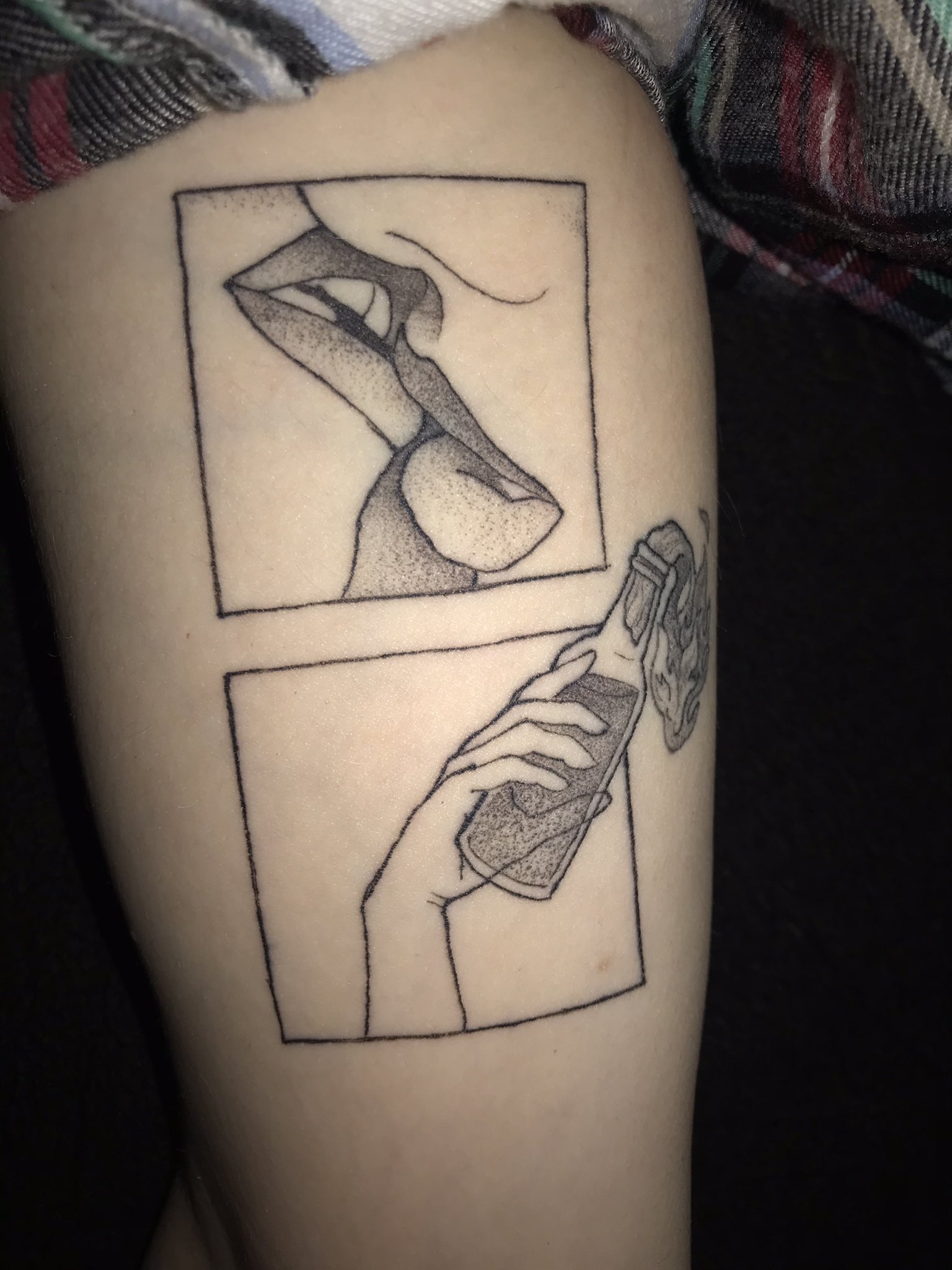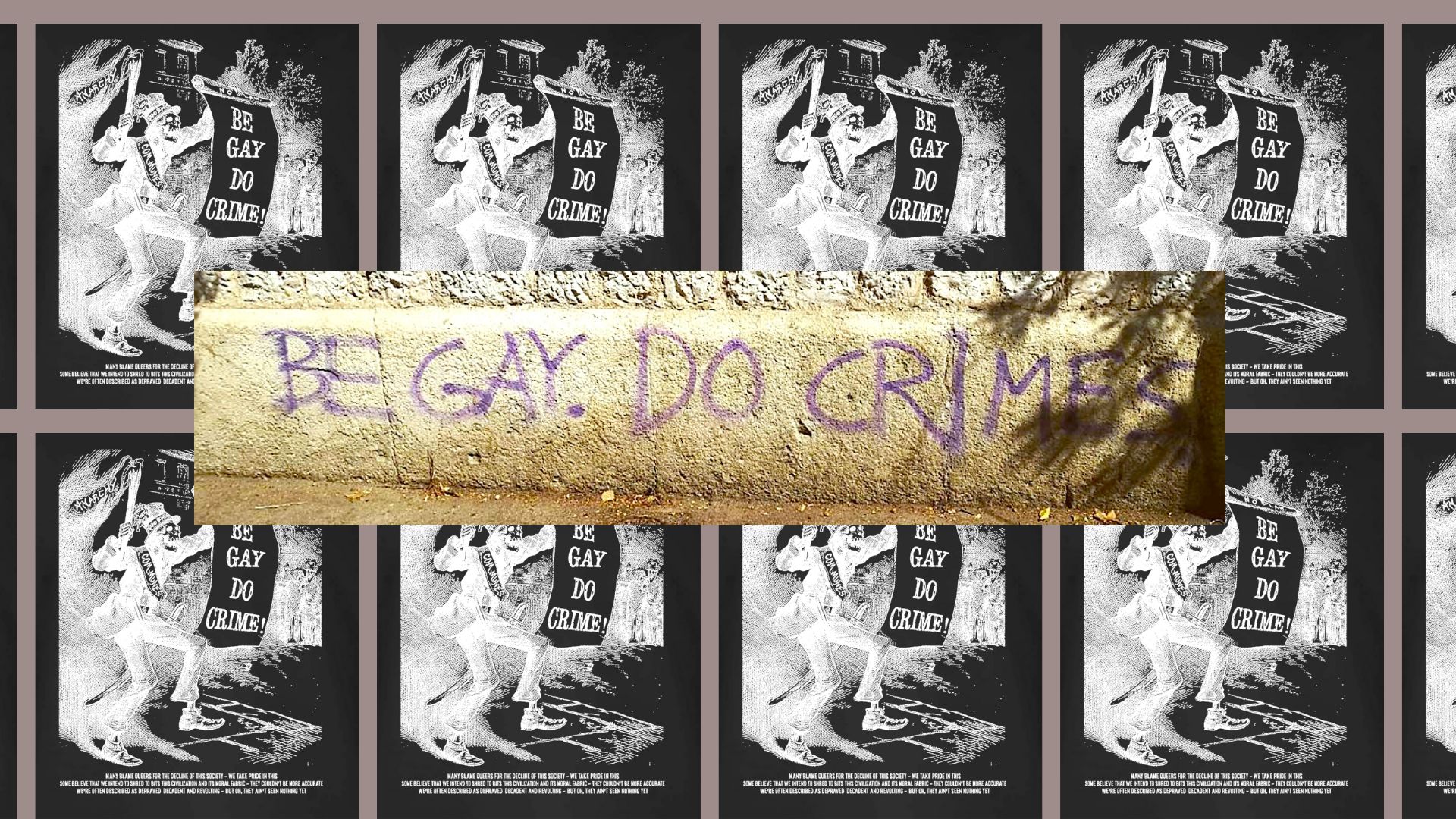The phrase “Be gay, do crime(s)” is a hairpin trigger for the conservative outrage machine, as a non-binary law professor found out after using it in a TikTok video that unwittingly introduced the words to a disapproving new audience.
But in queer communities, the heavily memed and relentlessly merchandised slogan is both a rallying cry and a winking inside joke—or an eye-roll-inducing cliché, depending who you ask—with a short but rich history rooted in anarchism and the fight for queer liberation. (Both the singular “Be gay, do crime,” and plural, “Be gay, do crimes,” are used, though the singular is in much more regular use.)
Last fall, criminal law professor Florence Ashley made a short TikTok saying, “As a law professor who teaches criminal law, I felt compelled to inform you to be gay, do crimes.” The video was derisively reposted by rage-farming social media outlet Libs of TikTok and culture warrior psychologist Jordan Peterson, and inspired a column in right-wing media outlet Western Standard titled “Is this any way for a law professor to talk?” The columnist dug up a number of comments from Ashley’s website and social media accounts, heavily implying that the answer to her question was “No.”
Undeterred by the backlash, Ashley tells Xtra they got a tattoo “out of spite” that visually represents the slogan: two pairs of feminine lips closing in on a kiss, above a hand holding a molotov cocktail. This brought on another round of condemnation from Libs of TikTok and other right-wing media spinsters in January, including the Post Millennial.
The crucial context the critics missed was that Ashley’s video was connected to a series of lectures from their criminal law class questioning the notion that the law should be the ultimate arbiter of morality, and examining when jurists have a duty to break an unjust law.

Florence Ashley’s “Be Gay, Do Crime” inspired tattoo. Credit: Courtesy of Florence Ashley
“If you have a fundamentally just law and fundamentally just system, it is pretty obvious that deliberately violating the law would be wrong,” Ashley tells Xtra. “On the other hand, you have situations like Nazi Germany, where one would hope that we have generally agreed upon the fact that you have a very active obligation to resist the Nazi regime, even if that means doing crime—and perhaps especially if that means doing crime.”
The broader conversation circles back to the viral slogan which, beneath its flippant exterior, gets to the heart of what it means to live in a society that criminalizes the existence of marginalized people.
“As queer people, as people who have been placed outside the margins of what’s considered acceptable in the system, we have perhaps more of an intuitive and intimate understanding of the fact that just because something is defined as a crime doesn’t mean that it’s wrong, morally speaking,” Ashley says. “But it’s also a recognition that increasingly, as was the case in the past, being gay or being trans is itself being criminalized.”
Marke Bieschke, publisher of news site 48 Hills and former curator of San Francisco’s GLBT Historical Society Museum, has been involved in queer protest movements since the early 1990s and says he first saw the phrase pop up in the early 2000s.
Many activists in that era grew up when being gay was still illegal—the U.S. did not fully overturn its sodomy laws until 2003—and were lashing out against “pinkwashing” as they watched corporations suddenly using gay pride and queer identity as marketing tools.
Bieschke says he heard the phrase chanted at protests around 2005, driven by groups like Gay Shame, which were an “anarchistic counterpoint” to the commercialization of Pride.
“Not only was it hella cool if you’re a young person—it makes you edgy and gives you a cultural cachet, and it’s fun to say … But it also represented a growing knowledge of their agency being co-opted, and their identity being co-opted,” he says.
Bieschke recalls memes circulating on Tumblr around 2008 to 2010, but says the slogan exploded in popularity during Donald Trump’s presidency. He says this was likely related to the rise of fascist ideology in the U.S., which is also what makes it so triggering in certain right-wing circles—“conservatives are gaining power and they just don’t want to hear anybody fight back in any context.
“To me, it’s not telling people to go out willy-nilly and rape, murder and maul people. It’s just kind of a reclamation of space for us within a legal system that has kept us down for thousands of years,” Bieschke says. “But also, for me, it just really keeps alive the sentiment that we should always be questioning what’s happening around our community in terms of commercial co-optation, in terms of legal shenanigans, especially now with such a huge backlash against trans people.”
A 2016 Instagram post by user @absentobject of graffiti sprayed on a wall in Marseille, France, reading “Be Gay. Do Crimes,” made the rounds online after being shared on the Queer Graffiti Tumblr. But it was in 2018 that the slogan took full flight, thanks to a T-shirt design by non-binary artist Io Asunder. The graphic, an alteration of a Thomas Nast political cartoon from 1880, depicts a skeleton holding a scroll bearing the phrase while holding a torch with the word “Anarchy.” Beneath the main graphic reads “Many blame queers for the downfall of this society—we take pride in this. Some believe that we intend to shred-to-bits this civilization and it’s [sic] moral fabric—they couldn’t be more accurate. We’re often described as depraved, decadent and revolting—but oh, they ain’t seen nothing yet.”
The shirt was made as a fundraiser for ABO Comix, a company they co-founded to publish art made by LGBTQ2S+ people in prison.
Asunder, a self-described anarchist, posted the design on the internet and went to sleep.
“I woke up and I was like, ‘Oh, no, it’s everywhere,’” they say.
Asunder suspects the phrase resonated so deeply at the time because of the political climate, with nascent fascist and neo-Nazi movements bubbling up across the U.S.
“Most of the people I knew who were out there risking themselves against fascists were queers and weren’t really concerned with respectability … We were there to stop Nazis and stop the spread of fascism. So I think people were connecting with a spirit of queer insurrectionary anarchism,” Asunder says.
The now iconic design changed their life. From being a squatter living in abandoned houses and “stealing to stay alive,” they now make a living as an independent artist, after the shirt drew attention to their other work.
Asunder means the phrase in the way right-wing reactionaries fear—as an attack on the forces of “straight, patriarchal capitalist hegemony,” and a refusal to assimilate or abide by its rules.
“There are people who say queers want to destroy Western civilization. And I’m like, yeah, they’re right. I think this sucks and I want to destroy it,” they say.
The slogan “sort of represents that queerness is by its nature anti-assimilation. At its core, it’s just funny, it’s sort of caveman-speak. Like, it’s stupid. I love that.”
Much like the corporate co-optation that inspired the slogan at protests two decades ago, however, its viral popularity has done the same to the phrase itself.
“Be gay, do crime” has been “de-fanged” by gay lifestyle brands, Asunder says, joking that every time Pride season rolls around, they are expecting McDonald’s to use the slogan to sell burgers.
“If a liberal says it but then clutches their pearls about a police car getting torched, I’m like, ‘Oh, man, you didn’t really take it in the spirit that I meant it,’” they say. “But whatever, it’s out in the world. It would be very cringey to try and control something once it belongs to the world like that. I am just excited that a lot of people have connected with it.”
And as much as the phrase represents opposition to societal norms, it can also build bridges.
ABO Comix co-founder Casper Cendre says Asunder’s drawing has essentially created an online community for people who might not know each other in real life but have a similar way of thinking.
Cendre proudly wears the shirt with the iconic design, and finds it has opened avenues to foster understanding beyond the internet.
“I’ve had old ladies stop me in the grocery store and be like, ‘Be gay do crimes, what do you mean by that?’ And we’ll have a conversation and they’ll be like, ‘Yeah, back in my day I had gay friends, but nobody was out of the closet,’” Cendre says.
“I think when people see it, especially in the older generation, they’re immediately kind of put off. But then if they have the courage to come and have a conversation about it, then we realize we’re really not different.”
For Bieschke, “Be gay, do crime” is a lasting example of online resistance, and positive reinforcement of the good that a community can do by questioning the world and itself.
“At first glance, it fills me with a spark of joy,” he says. “It fills me with delight because it means people are still questioning things and our community is still able to piss people off just by saying something and being ourselves.”


 Why you can trust Xtra
Why you can trust Xtra


